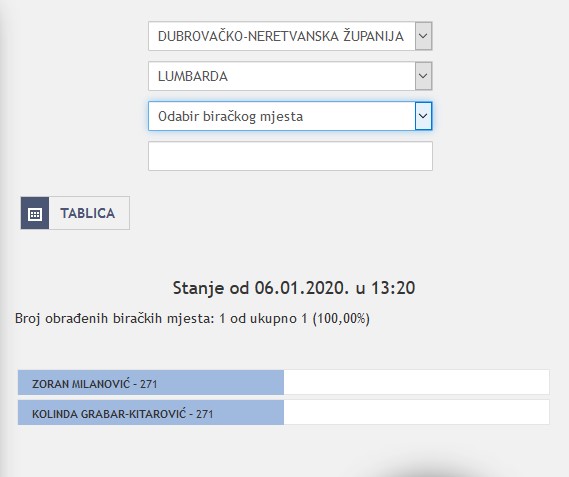Croatian Presidential Elections 2020: Were There Ties?
Just like TCN's owner, Paul Bradbury, I too am very interested in statistics and the numbers that appeared after the elections like yesterday's Croatian runoff of the presidential elections 2020.
But, unlike Paul, who was aiming to analyse the big picture of what the data was telling us about Croatian politics and the population, I was looking for the weird and the bizarre. It started yesterday evening when I was browsing around Croatia, looking at the State Electoral Commission site and the results that were shown there as the votes were counted. One of the things I noticed was that Lumbarda, a village on Korčula island, a municipality with just one polling station, was split right down the middle: both Zoran Milanović and Kolinda Grabar-Kitarović got 271 votes in Lumbarda!

Then I was told an unofficial piece of information that Žrnovo, another village on Korčula, 10 kilometres away from Lumbarda, was also divided perfectly between the candidates! I wasn't able to verify that right away, but as soon as I got my hands on the full spreadsheet of the results of presidential elections 2020, published today by the Electoral Commission, that was the first thing I checked. And, yes, they were right, polling station no. 4 in Korčula municipality, located in Žrnovo, had the result 303:303.
Of course, when you have 2 candidates, it's not at all surprising that there will be situations where the number of votes per polling station would be exactly the same. But I had to go and find out, how many were there? Lumbarda is the only municipality in Croatia that really doesn't know who they'd prefer for Croatian president. Other ties happened at the level of polling stations, and there were exactly 44 of them. About a dozen of those were in Zagreb County, a few in the City of Zagreb, a few in Bjelovar-Bilogora County and a couple in each of the remaining counties (the two on Korčula are the only ones in Dubrovnik-Neretva County). Oh, there's another one: in the Croatian Embassy in Finland, in Helsinki, 5 people voted for Zoran Milanović, while 5 other Finnish Croats voted for Kolinda Grabar-Kitarović!
Most of the total votes were cast at several polling stations in Bosnia and Herzegovina, Zagreb and one in Kastav. On the other side of that spectrum is a polling station in Vladisovo in Brod-Posavina County, located in a private house, where two people voted: one of the ballots was invalid, while the other person voted for Kolinda Grabar-Kitarović!
To find out more about the results and see graphical representations of them, visit viborc.com, who also helped me handle the data for this article.
How did Croats in Ireland Vote in Croatian Presidential Elections?
Ever since Croatia joined the European Union (EU) back in July 2013, the number of Croats in Ireland, as well as other EU countries, has soared. Croats have used the opportunities of most of Europe's borders being opened to them. Upon joining, Croatia entered the single market and gained access to the majority of the labour markets of individual European Union member states, with the initial exception of a few, the respective barriers of which have now also been dropped for Croatian citizens.
In addition to Germany, Ireland has also been a favourite for Croats to emigrate to, often quickly gaining employment and settling into a nice lifestyle there, either temporarily with the intention to return home, or permanently, with no intention of ever coming to Croatia again unless the visit is for a family holiday.
With Croatia's presidential elections finally coming to a head, just what did the many Croats in Ireland think of the political situation back home? It's well known that presidential candidate Zoran Milanovic visited Croats in Ireland, apparently ''not to earn their votes'' but to ''see and hear the reasons why they left Croatia in the first place''. Regardless of the reasoning behind it, SDP's Milanovic made the trip to the emerald isle. Kolinda, on the other hand, did not...
As Poslovni Dnevnik writes on the 23rd of December, 2019, over in the Republic of Ireland, no Croatian citizen voted for Nedjeljko Babic, nor did any vote Anto Djapic.
Otherwise, when it comes to Croatian citizens abroad, Kolinda Grabar-Kitarovic leads the way with 52.48 percent of the vote. Miroslav Skoro closes in in second place with 35.66 percent of the vote, and third in line is SDP's Zoran Milanovic with 6.04 percent. When it comes to Croats in Ireland, however, the situation is a little bit different.
In Ireland, now the home of a considerable number of Croats, HDZ's Kolinda Grabar-Kitarovic won only three percent of the vote, given the fact that just 100 people Croatian citizens went to the polls Ireland, according to the results of the State Electoral Commission, leading to just three people circling her name on their ballot.
Katarina Peovic also enjoyed a mere three votes from Croats in Ireland, while Dejan Kovac and Dalija Oreskovic received one vote each. As stated, in Ireland, nobody voted for Nedeljko Babic, nor for Ante Djapic.
The biggest winner in Ireland is Miroslav Skoro, holding 23 percent of Ireland's Croatian diaspora vote. This was followed by Mislav Kolakusic with 22 percent, followed by Ivan Pernar, whose name was circled by 20 people. 19 percent of Croats in Ireland who cast their votes voted for Zoran Milanovic, while just 6 percent voted for Dario Jurican.
Make sure to follow our dedicated politics page for much more.

